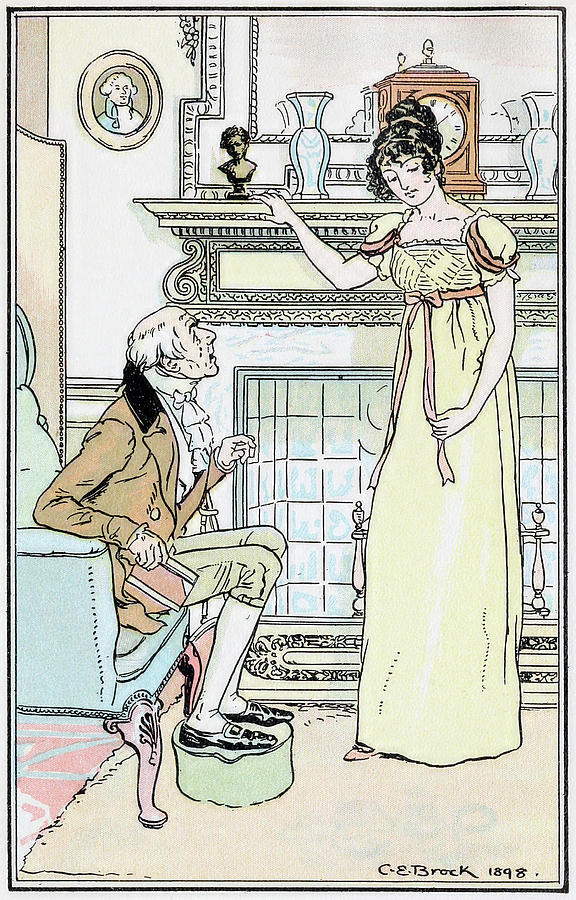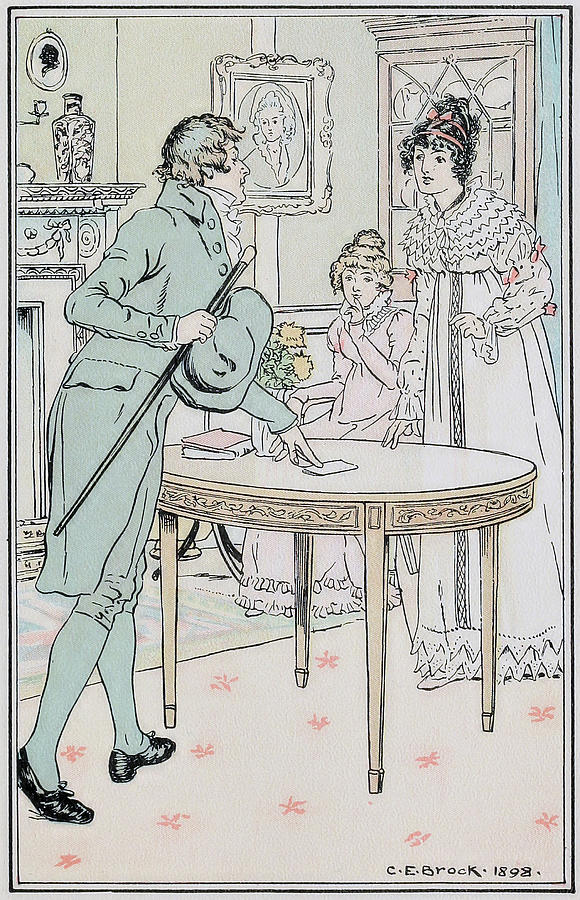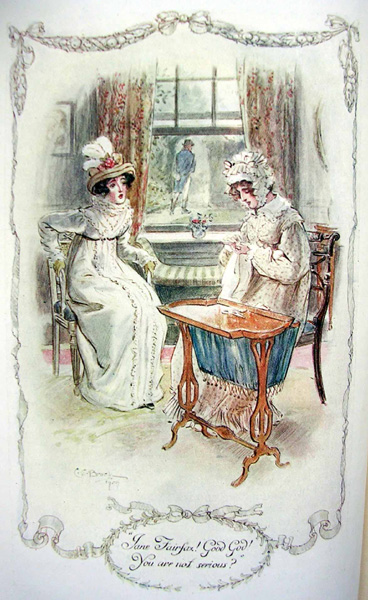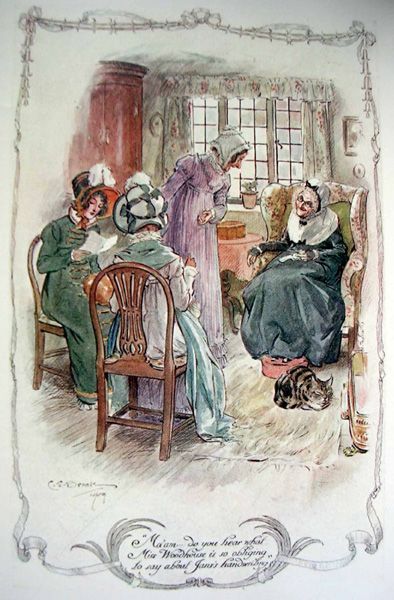二)爱情与婚姻难两全吗?
小说《爱玛》中让人印象最深刻的配角当属埃尔顿太太,不见其人,已闻其声,她的那段关于草莓的长篇大论经常被后世的读者引用。
简.奥斯汀通过惊叹号、引号和断句打造了一段支离破碎的讲话,看似埃尔顿太太一个人的独白,实则将其他人的插话和问话省略掉了,让读者听到的全是埃尔顿太太的声音。现代文学评论家认为:奥斯汀开创的这种新的写作手法和技巧让我们预见到了现代主义的智慧。

另外一个让人瞩目的配角是贝茨小姐,也是个饶舌妇。第三卷第二章,当贝茨小姐来到皇冠旅馆的舞会时,奥斯汀又用类似的手法写了她的一大段喋喋不休的讲话:“你们真是太好了!— 根本没有雨。没什么大不了的。我自己倒不在乎。鞋子厚得很。简说——哇!(她一进门就嚷道)。哇!这简直是太辉煌了!— 太令人钦佩了!— 我敢说,设计得太棒了。应有尽有,难以想象。— 灯光这么亮!— 简,简,你看 — 你曾经见过这些吗?哦!韦斯顿先生,你一定是拥有了阿拉丁神灯。好心的斯托克斯太太都要认不出自己的房间了。我进来的时候就见到她了,她站在门口。‘哦!斯托克斯太太,’我说 —可我没工夫再说下去了。”这时,韦斯顿太太过来问候她。“很好,谢谢你,太太。希望您一切都好。听到这些很开心。我还担心你会头痛呢!— 经常看见你路过,知道你一定有不少麻烦事。我真的很高兴听到您身体很好。啊!亲爱的埃尔顿太太,谢谢你的马车!— 来得正是时候,简和我正准备走呢。一刻也没让马等候。好舒适的马车呀。— 哦!我敢说,韦斯顿太太,我们得为此感谢你。— 埃尔顿太太十分亲切地给简写了封信,不然我们就坐你的车了。— 一天里两次有人提出用车送我们呀!— 从没见过这么好的邻居。我跟我妈妈说:‘说实在话,妈妈——’谢谢,我妈妈身体非常好,上伍德豪斯先生家去了。我让她带上了披巾——晚上可不暖和呀——她那条新的大披巾——是迪克逊太太的结婚礼物。— 她太好了,还想到了我妈妈!你知道,是在韦默斯买的——迪克逊先生挑选的。简说还有另外三条,他们犹豫了一阵。坎贝尔上校喜欢橄榄色的。亲爱的简,你肯定你的鞋子没湿吗?— 只下了一两滴雨,可我还是担心。— 弗兰克·邱吉尔先生真是太——还找了块垫子让人踩着走——他太客气了,我一辈子也忘不了。哦!弗兰克·邱吉尔先生,我要告诉你,我妈妈的眼镜后来再也没出过毛病,那个铆钉再也没脱落过。我妈妈时常夸你脾气好,对吧,简?— 我们不是时常谈起弗兰克·邱吉尔先生吗?— 啊!伍德豪斯小姐来了。— 亲爱的伍德豪斯小姐,你好。— 我很好,谢谢,很好。这是相聚在仙境里呀!— 多大的变化啊!— 我知道,不能恭维,”(得意洋洋地瞅着爱玛)— 那样是很鲁莽的— 不过,说实在的,伍德豪斯小姐,你看上去真 —你看简的头发怎么样?— 你最有眼力。— 全是她自己梳的。她梳得多好啊!— 我想伦敦的理发师也梳不了这么好。— 啊!我敢说是休斯大夫— 还有休斯太太。我要去跟休斯大夫夫妇聊一聊。— 你好。你好。— 我很好,谢谢。好快活呀,是吧?— 理查德先生在那儿呢?— 哦!在那儿。别打扰他。跟年轻小姐们聊天要好得多。你好吗,理查德先生?— 那天我看见你骑着马从城里——我敢说,这是奥特维太太!- 还有善良的奥特维先生,奥特维小姐,卡罗琳小姐。— 这么多朋友!— 还有乔治先生和阿瑟先生!— 你们好。各位都好。— 我很好,非常感谢。从没这样好过。— 我是不是听见又来了一辆马车?— 能是谁呢?可能是尊贵的科尔一家吧。— 说真的,跟这样的朋友在一块儿,多有意思啊!多旺的火啊!— 我快给烤熟了。— 不,谢谢,我不喝咖啡 — 从不喝咖啡。可以给我一些茶,先生,过一会儿吧 — 不着急— 哦!送来了。一切都这么棒!”
("So very obliging of you!--No rain at all. Nothing to signify. I do not care for myself. Quite thick shoes. And Jane declares-- Well!--(as soon as she was within the door) Well! This is brilliant indeed!--This is admirable!--Excellently contrived, upon my word. Nothing wanting. Could not have imagined it.--So well lighted up!-- Jane, Jane, look!--did you ever see any thing? Oh! Mr. Weston, you must really have had Aladdin's lamp. Good Mrs. Stokes would not know her own room again. I saw her as I came in; she was standing in the entrance. `Oh! Mrs. Stokes,' said I-- but I had not time for more." She was now met by Mrs. Weston.-- "Very well, I thank you, ma'am. I hope you are quite well. Very happy to hear it. So afraid you might have a headache!-- seeing you pass by so often, and knowing how much trouble you must have. Delighted to hear it indeed. Ah! dear Mrs. Elton, so obliged to you for the carriage!--excellent time. Jane and I quite ready. Did not keep the horses a moment. Most comfortable carriage.-- Oh! and I am sure our thanks are due to you, Mrs. Weston, on that score. Mrs. Elton had most kindly sent Jane a note, or we should have been.-- But two such offers in one day!--Never were such neighbours. I said to my mother, `Upon my word, ma'am--.' Thank you, my mother is remarkably well. Gone to Mr. Woodhouse's. I made her take her shawl--for the evenings are not warm--her large new shawl-- Mrs. Dixon's wedding-present.--So kind of her to think of my mother! Bought at Weymouth, you know--Mr. Dixon's choice. There were three others, Jane says, which they hesitated about some time. Colonel Campbell rather preferred an olive. My dear Jane, are you sure you did not wet your feet?--It was but a drop or two, but I am so afraid:--but Mr. Frank Churchill was so extremely-- and there was a mat to step upon--I shall never forget his extreme politeness.--Oh! Mr. Frank Churchill, I must tell you my mother's spectacles have never been in fault since; the rivet never came out again. My mother often talks of your good-nature. Does not she, Jane?--Do not we often talk of Mr. Frank Churchill?-- Ah! here's Miss Woodhouse.--Dear Miss Woodhouse, how do you do?-- Very well I thank you, quite well. This is meeting quite in fairy-land!-- Such a transformation!--Must not compliment, I know (eyeing Emma most complacently)--that would be rude--but upon my word, Miss Woodhouse, you do look--how do you like Jane's hair?--You are a judge.-- She did it all herself. Quite wonderful how she does her hair!-- No hairdresser from London I think could.--Ah! Dr. Hughes I declare-- and Mrs. Hughes. Must go and speak to Dr. and Mrs. Hughes for a moment.--How do you do? How do you do?--Very well, I thank you. This is delightful, is not it?--Where's dear Mr. Richard?-- Oh! there he is. Don't disturb him. Much better employed talking to the young ladies. How do you do, Mr. Richard?--I saw you the other day as you rode through the town--Mrs. Otway, I protest!-- and good Mr. Otway, and Miss Otway and Miss Caroline.--Such a host of friends!--and Mr. George and Mr. Arthur!--How do you do? How do you all do?--Quite well, I am much obliged to you. Never better.-- Don't I hear another carriage?--Who can this be?--very likely the worthy Coles.--Upon my word, this is charming to be standing about among such friends! And such a noble fire!--I am quite roasted. No coffee, I thank you, for me--never take coffee.--A little tea if you please, sir, by and bye,--no hurry--Oh! here it comes. Every thing so good!")

当然,主人公爱玛是听不进贝茨小姐的唠叨的,很多读者在阅读过程中也略过了贝茨小姐的“演讲”。但奥斯汀却在这个被人忽视的老妇人的话语中巧妙地嵌入了故事的真实线索,比如,弗兰克与简之间早已偷偷恋爱并私定终身。如果你把《爱玛》当作一个侦探故事来读,抽丝剥茧,就会发现贝茨小姐的话才是最真实可靠的见证。如果你忽略了贝茨小姐貌似鸡零狗碎的叙述,就会一直被爱玛的主观臆断牵着鼻子走,以为英俊、聪明、幽默、殷勤的弗兰克对爱玛情有独钟。
爱玛眼里的弗兰克是什么样的呢?第二部第十三章,奥斯汀将读者引入了爱玛的内心世界,如下:
“爱玛还是毫不怀疑自己坠入了情网,只是不确定程度有多深。起初,她以为爱得很深,后来又觉得只是稍微有一点点。她非常喜欢听人家谈论弗兰克·邱吉尔,因为他的缘故,比以往更喜欢见到韦斯顿夫妇。她时常想念弗兰克,急切地等着他的来信,从信里就知道他好不好,情绪高不高,舅妈好不好,今年春天他有没有可能再来兰多尔斯。但是另一方面,她又不承认自己不开心,不承认自己在第一个早晨后比往常更懒惰。她照样忙碌和快乐着,尽管弗兰克讨人喜欢,她还是认为他有缺点。她虽然很想念他,坐着画画或做针线的时候,还为他们感情的发展和结局进行千种愉悦的谋划,幻想着有趣的对话,杜撰着一封封文字优美的信件,但每次想象着弗兰克向她求爱时,她都拒绝了他。他们之间的情意总是落得普通的友情。所有温柔而迷人的一切都是为了预示他们会分开,但最终仍要分离。她一意识到这一点,就惊觉自己不可能爱得很深。尽管她以前下定决心,永不离开父亲,永不出嫁,可是如果发生了强烈的爱情,一定会在她心中产生她料想不到的挣扎。”
(Emma continued to entertain no doubt of her being in love. Her ideas only varied as to the how much. At first, she thought it was a good deal; and afterwards, but little. She had great pleasure in hearing Frank Churchill talked of; and, for his sake, greater pleasure than ever in seeing Mr. and Mrs. Weston; she was very often thinking of him, and quite impatient for a letter, that she might know how he was, how were his spirits, how was his aunt, and what was the chance of his coming to Randalls again this spring. But, on the other hand, she could not admit herself to be unhappy, nor, after the first morning, to be less disposed for employment than usual; she was still busy and cheerful; and, pleasing as he was, she could yet imagine him to have faults; and farther, though thinking of him so much, and, as she sat drawing or working, forming a thousand amusing schemes for the progress and close of their attachment, fancying interesting dialogues, and inventing elegant letters; the conclusion of every imaginary declaration on his side was that she refused him. Their affection was always to subside into friendship. Every thing tender and charming was to mark their parting; but still they were to part. When she became sensible of this, it struck her that she could not be very much in love; for in spite of her previous and fixed determination never to quit her father, never to marry, a strong attachment certainly must produce more of a struggle than she could foresee in her own feelings.

“ ‘我发现自己并没有使用牺牲这个字眼,’ 她心想。‘我做了那么多机敏的回答,巧妙的否定,却没有一次暗示过要作出牺牲。我并不认为一定非得到他才能幸福,没有他反而会更好。我绝对不会让自己爱得更深。我已经爱得够深了,不可能再深了。’
总的说来,一想到弗兰克的感情,她同样感到满意。”
("I do not find myself making any use of the word sacrifice," said she.-- "In not one of all my clever replies, my delicate negatives, is there any allusion to making a sacrifice. I do suspect that he is not really necessary to my happiness. So much the better. I certainly will not persuade myself to feel more than I do. I am quite enough in love. I should be sorry to be more."
Upon the whole, she was equally contented with her view of his feelings.
“ ‘毫无疑问,他已经深陷情网——种种迹象都表明了这一点——的的确确深陷情网!— 等他再来的时候,如果他仍旧情意绵绵,我必须小心翼翼地不再鼓励他。— 既然我的心意已定,不这样做是绝对不可宽恕的。我倒不是料想他会觉得我一直在鼓励他。不,如果他当真相信我也对他有意思,他就不会这么怏怏不乐了。如果他认为我是在鼓励他的话,他临别时的表情和言谈就会是另一副情形。— 然而,我还是得谨慎。这是假定他还像现在这样迷恋我,不过我不确定一切是否如初。我不认为他是那种人——我根本不指望他会坚定不移和忠贞不渝。— 他的感情是热烈的,但我可以想象得出是多变的。— 总之,每每想到这些,我都庆幸没有把我的幸福过多地指望在这份依恋中。— 我会很快没事的 —到那时,这又会成为一件好事了,因为据说每一个人一生都会坠入情网一次,而我一定会轻而易举地解脱出来。’”
("He is undoubtedly very much in love—every thing denotes it—very much in love indeed!—and when he comes again, if his affection continue, I must be on my guard not to encourage it.—It would be most inexcusable to do otherwise, as my own mind is quite made up. Not that I imagine he can think I have been encouraging him hitherto. No, if he had believed me at all to share his feelings, he would not have been so wretched. Could he have thought himself encouraged, his looks and language at parting would have been different.—Still, however, I must be on my guard. This is in the supposition of his attachment continuing what it now is; but I do not know that I expect it will; I do not look upon him to be quite the sort of man—I do not altogether build upon his steadiness or constancy.—His feelings are warm, but I can imagine them rather changeable.—Every consideration of the subject, in short, makes me thankful that my happiness is not more deeply involved.—I shall do very well again after a little while—and then, it will be a good thing over; for they say every body is in love once in their lives, and I shall have been let off easily." )

然而现实与爱玛的主观感觉恰好相反,弗兰克正偷偷地与孤女简相爱,但他假装对爱玛很殷勤,以转移邻人们的视线。如果读者一直跟随爱玛的视野看问题,不知不觉间就被弗兰克愚弄了。再举书中一个生动的例子:
第二卷第十章,“她们(爱玛、韦斯顿太太,贝茨小姐)走进那间小起居室,发现里面安安静静的:贝茨太太没有做她平时做的事,坐在火炉边打瞌睡;弗兰克·邱吉尔坐在她旁边的一张桌子边,正聚精会神地忙着给她修眼镜;简·费尔法克斯则背朝着他们站在那儿,目不转睛地望着钢琴。
那位年轻人虽然正忙着,但是一见到爱玛,仍然露出一副高兴的表情。
‘真令人高兴,’他说,声音压得很低,‘比我预料的至少早到了十分钟。你们瞧,我想帮点儿忙。你们看我能不能修好。’
‘什么!’韦斯顿太太说,‘还没修好啊?如果你是个银匠的话,按这个速度做活,可挣不了钱过好生活。’
‘我又不是一直在修眼镜,’弗兰克答道。‘我刚才帮费尔法克斯小姐把她的乐器放稳。原来放得不大稳,我想是因为地板不平。你瞧,我们已经在一条琴腿底下垫上了纸。你们真好,给请来了。我还有点担心你们要急着回家呢。’
他设法让爱玛坐在他身边,殷勤地给她挑了个最好的烤苹果,还请她帮帮忙,指点他修眼镜,直至简·费尔法克斯准备就绪,再一次坐在钢琴跟前。她没有马上准备好,爱玛怀疑这是心绪不宁的缘故,她拥有这架钢琴的时间还算太长,无法做到心平气和地弹奏,必须冷静一下才能感受表演的力量。这种心情不管源自何因,爱玛只能表示怜悯,只能打定主意不将其暴露给她旁边的几个人。

简终于开始演奏了。尽管头一个小节弹得有气无力,但是钢琴的良好性能渐渐地充分发挥出来了。韦斯顿太太以前听得乐滋滋的,这次又听得乐滋滋的。爱玛跟她一起赞叹不已。还有那架钢琴,经过种种严格的鉴定,被宣称为上上品。”
(The appearance of the little sitting-room as they entered, was tranquillity itself; Mrs. Bates, deprived of her usual employment, slumbering on one side of the fire, Frank Churchill, at a table near her, most deedily occupied about her spectacles, and Jane Fairfax, standing with her back to them, intent on her pianoforte.
Busy as he was, however, the young man was yet able to shew a most happy countenance on seeing Emma again.
"This is a pleasure," said he, in rather a low voice, "coming at least ten minutes earlier than I had calculated. You find me trying to be useful; tell me if you think I shall succeed."
"What!" said Mrs. Weston, "have not you finished it yet? you would not earn a very good livelihood as a working silversmith at this rate."
"I have not been working uninterruptedly," he replied, "I have been assisting Miss Fairfax in trying to make her instrument stand steadily, it was not quite firm; an unevenness in the floor, I believe. You see we have been wedging one leg with paper. This was very kind of you to be persuaded to come. I was almost afraid you would be hurrying home."
He contrived that she should be seated by him; and was sufficiently employed in looking out the best baked apple for her, and trying to make her help or advise him in his work, till Jane Fairfax was quite ready to sit down to the pianoforte again. That she was not immediately ready, Emma did suspect to arise from the state of her nerves; she had not yet possessed the instrument long enough to touch it without emotion; she must reason herself into the power of performance; and Emma could not but pity such feelings, whatever their origin, and could not but resolve never to expose them to her neighbour again.
At last Jane began, and though the first bars were feebly given, the powers of the instrument were gradually done full justice to. Mrs. Weston had been delighted before, and was delighted again; Emma joined her in all her praise; and the pianoforte, with every proper discrimination, was pronounced to be altogether of the highest promise.)

显然,爱玛并没有察觉到弗兰克和简之间有什么特别不妥当的地方,可是如果你重读之前的那一章(第二卷第九章),就会从贝茨小姐的断断续续唠叨中发现:弗兰克是特地找借口去了贝茨小姐的公寓,并将她打发到大街上邀请爱玛来家里做客。贝茨小姐走后,房间里只剩下他、睡着了的老贝茨太太和简三人。两个年轻人趁机私会,会做些什么呢?拥抱、亲吻、耳鬓厮磨?— 但凡有过恋爱经历的读者都可以脑补出这些情节。只是没想到爱玛她们提前十分钟来到了公寓,拥抱中的一对恋人听到脚步声,慌慌张张地分开,弗兰克假装镇定地修眼镜,简背朝着他,目不转睛地盯着钢琴,却仍难以抚平内心的紧张和激动。演奏技巧高超的她竟然没有弹好第一个小节,琴音有气无力的。- 四十不惑后重读《爱玛》,我终于猜到了这些不曾展现在字里行间的真相。可见简.奥斯汀具有非凡的戏剧创作才能,她并没有直接告诉读者书中其他角色的性格和内心感受,却通过这些看似平凡的细节描写一一展现了鲜明的个体。她在这方面的才能可与戏剧大师莎士比亚相媲美。
简.奥斯汀生前认为,幸福的婚姻必须建立在两情相悦和良好的经济基础上,两者缺一不可。她短暂的一生写了数部美好的爱情故事,却一辈子不结婚。难道她早已看透爱情与婚姻两难全的现实,不再抱有玫瑰色的幻想,所以给自己笔下的人物都安排了美好的结局,以弥补内心的缺憾?





